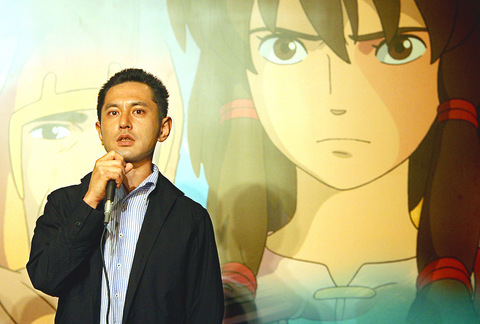For Goro Miyazaki, the summer ended on a bittersweet note. This 39-year-old filmmaker had the pleasure of seeing his first movie, the animated feature Gedo Senki, or Tales From Earthsea, blossom into the biggest hit of the summer in Japan, as it rose to the top spot and took in more than US$61.4 million by the end of last month.
But even his success brought inevitable reminders that he is, after all, the other Miyazaki. His Oscar-winning father, Hayao, regarded by many critics as the greatest director working in animation today, has earned much more with his own hits. Ursula K. Le Guin, author of the popular Earthsea novels, on which the new film was based, went out of her way to make the distinction on her Web site, calling the father “a genius of the same caliber as Kurosawa or Fellini.” She went on to complain about the liberties Goro and his new film took with her work.
“Of course a movie shouldn't try to follow a novel exactly — they're different arts, very different forms of narrative,” she wrote. “There may have to be massive changes. But it is reasonable to expect some fidelity to the characters and general story in a film named for and said to be based on books that have been in print for 40 years.”

PHOTO: NY TIMES NEWS SERVICE
So the younger Miyazaki can be forgiven a bit of weariness. “Sometimes I wish hadn't entered the same profession as my father,” he said, speaking through an interpreter during an interview at Studio Ghibli, headquarters of Hayao Miyazaki and the director Isao Takahata, in this suburb of Tokyo. “I realized for the first time how difficult it is to be the son of Hayao Miyazaki. If I weren't involved in animated filmmaking, I would just have a simple, quiet, normal life.”
The film received an enthusiastic response at the Venice Film Festival this summer and is set for an eagerly anticipated European release in 2007.
Miyazaki based Gedo Senki primarily on The Farthest Shore, the third book in Guin's series, in which Ged, the Archmage, and Arren, Prince of Enlad, must defeat an evil sorcerer whose efforts to cheat death are destroying the balance that governs the realm of Earthsea. But Miyazaki added elements from the other novels and changed some aspects of the story. In the opening of the film, the darkness falling over the world causes Arren to stab his father; his quest for an escape from his crime leads him to Ged and the eventual confrontation with the sorcerer.
As a teenager Miyazaki read the Earthsea books, and he originally planned to make a faithful interpretation. “But as I continued on the project, I realized that adapting the story exactly was not really what I should do,” he said. “In order for me to speak to younger audiences, some changes had to be made because of the gap between when the book was written and when I made the film. I feel that metropolitan culture is becoming a dead end and there's nowhere to go. I can't just shout, ‘Return to nature,’ but we need to rethink how we can live in cities yet remain close to nature.”
Le Guin offered a balanced response, saying: “I thought the moral lectures in the film were spoken eloquently. In fact they were often quoted pretty directly from the books. But I didn't see how the action of the film justified them. They felt pasted on to me. I did not understand why Arren stabs his father, nor how and why he earned redemption.”
“I get roundly scolded on my Web site by younger Japanese people for not understanding the movie. These people don't know the books, so they're not confused, as I was.”
Toshio Suzuki, Studio Ghibli's president, acknowledged that the film had drawn some unfavorable responses. “The reactions from some animation fans have been very negative,” he said. “They compare Goro's work and his father's, just as fans of the novels complain that the film is different from the books. I discovered that many fans of Hayao Miyazaki cannot accept anything else.”
The younger Miyazaki said it was Suzuki who initially persuaded him to take the considerable risk of following in his father's footsteps.
“I had never thought about becoming an animation director,” he said. “I was deceived by Suzuki, who was very clever about making me feel I could do it.”
A slim, soft-spoken man, the younger Miyazaki has not yet said whether he will direct another animated feature, though his father and Takahata, the principal directors at Studio Ghibli, have been looking for younger directors for years, saying the organization needs new blood.

Not long into Mistress Dispeller, a quietly jaw-dropping new documentary from director Elizabeth Lo, the film’s eponymous character lays out her thesis for ridding marriages of troublesome extra lovers. “When someone becomes a mistress,” she says, “it’s because they feel they don’t deserve complete love. She’s the one who needs our help the most.” Wang Zhenxi, a mistress dispeller based in north-central China’s Henan province, is one of a growing number of self-styled professionals who earn a living by intervening in people’s marriages — to “dispel” them of intruders. “I was looking for a love story set in China,” says Lo,

It was on his honeymoon in Kuala Lumpur, looking out of his hotel window at the silvery points of the world’s tallest twin skyscrapers, that Frank decided it was time to become taller. He had recently confessed to his new wife how much his height had bothered him since he was a teenager. As a man dedicated to self-improvement, Frank wanted to take action. He picked up the phone, called a clinic in Turkey that specializes in leg lengthening surgery — and made a booking. “I had a lot of second thoughts — at the end of the day, someone’s going

In the next few months tough decisions will need to be made by the Taiwan People’s Party (TPP) and their pan-blue allies in the Chinese Nationalist Party (KMT). It will reveal just how real their alliance is with actual power at stake. Party founder Ko Wen-je (柯文哲) faced these tough questions, which we explored in part one of this series, “Ko Wen-je, the KMT’s prickly ally,” (Aug. 16, page 12). Ko was open to cooperation, but on his terms. He openly fretted about being “swallowed up” by the KMT, and was keenly aware of the experience of the People’s First Party

Standing on top of a small mountain, Kim Seung-ho gazes out over an expanse of paddy fields glowing in their autumn gold, the ripening grains swaying gently in the wind. In the distance, North Korea stretches beyond the horizon. “It’s so peaceful,” says the director of the DMZ Ecology Research Institute. “Over there, it used to be an artillery range, but since they stopped firing, the nature has become so beautiful.” The land before him is the demilitarized zone, or DMZ, a strip of land that runs across the Korean peninsula, dividing North and South Korea roughly along the 38th parallel north. This